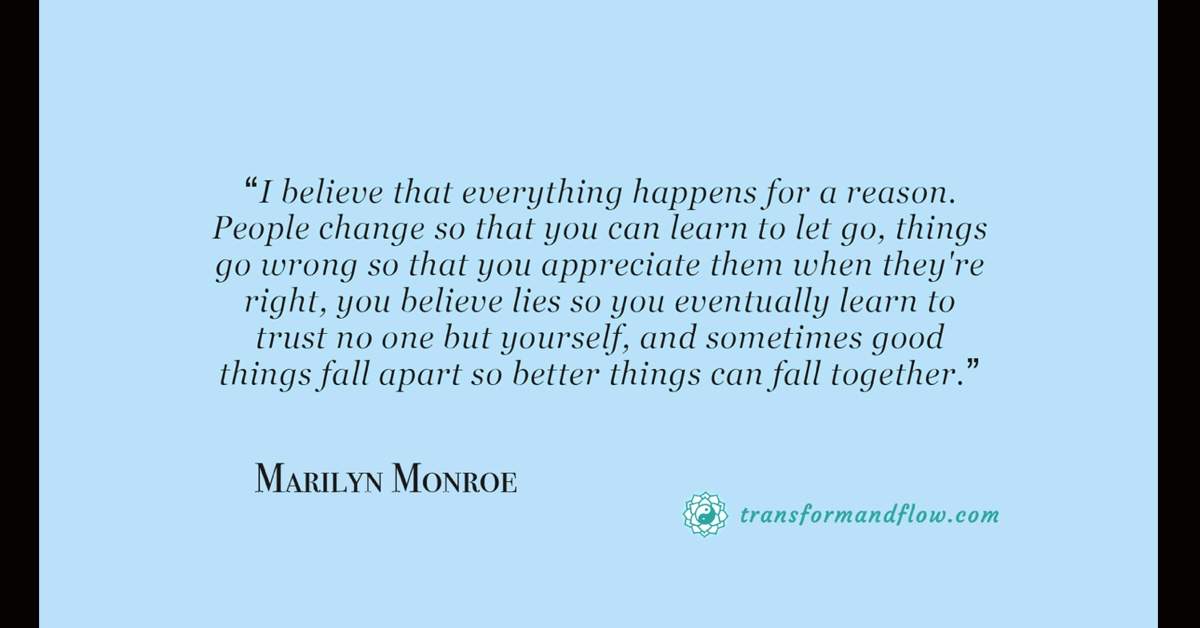Marilyn Monroe’s poignant observation,
“I believe that everything happens for a reason. People change so that you can learn to let go, things go wrong so that you appreciate them when they’re right, you believe lies so you eventually learn to trust no one but yourself, and sometimes good things fall apart so better things can fall together,”
isn’t a simple affirmation of fate. It’s a profound exploration of the human journey, a testament to the transformative power of adversity. It suggests that pain, loss, and disillusionment, while undeniably difficult, are not random acts of cruelty, but rather catalysts for growth and self-discovery.
Monroe’s words are a beacon of hope in the midst of life’s inevitable storms. They remind us that even in the darkest of times, there is a purpose, a lesson to be learned, a path towards a more profound understanding of ourselves and the world around us. It’s an invitation to embrace the alchemist’s crucible, where pain is transformed into wisdom, and loss into liberation.
The Necessity of Letting Go:
“People change so that you can learn to let go.” This speaks to the inherent impermanence of human relationships.
We often cling to people and situations, fearing the void that their departure will leave. Yet, holding on to what is no longer serving us only prolongs our suffering and prevents us from embracing new possibilities.
Letting go is not about forgetting or erasing the past. It’s about accepting the reality of change and releasing the emotional baggage that binds us to what was. It’s about creating space for new connections, new experiences, and a deeper understanding of our own resilience.
The Appreciation Born of Adversity:
“Things go wrong so that you appreciate them when they’re right.” This highlights the paradoxical nature of human experience.
We often take the good things in our lives for granted, only realizing their value when they are gone. It’s in the contrast of hardship that we truly appreciate the moments of joy, the stability of healthy relationships, and the simple pleasures of everyday life.
Adversity acts as a lens, sharpening our focus and revealing the beauty that often goes unnoticed. It teaches us gratitude, resilience, and the importance of cherishing the present moment.
The Path to Self-Trust Through Disillusionment:
“You believe lies so you eventually learn to trust no one but yourself.” This speaks to the inevitable disillusionment that comes with navigating the complexities of human relationships. We are often betrayed, misled, and manipulated, leaving us feeling vulnerable and distrustful.
However, these experiences, while painful, can also be transformative. They force us to develop critical thinking skills, to question assumptions, and to cultivate a deeper understanding of our own intuition. They teach us the importance of setting boundaries, protecting our emotional well-being, and ultimately, trusting our own judgment.
The Promise of Better Things:
“Sometimes good things fall apart so better things can fall together.” This offers a glimmer of hope in the face of loss and disappointment. It acknowledges that even the most cherished aspects of our lives can crumble, leaving us feeling lost and adrift.
Yet, within this destruction lies the potential for rebirth. The falling apart of “good” things can create the necessary space for something even better to emerge. It’s about trusting the process of life, believing that even in the midst of chaos, there is a guiding force, a natural order that ultimately leads us towards greater fulfillment.
The Alchemy of Transformation:
Monroe’s quote is an invitation to embrace the alchemy of transformation, to view our challenges not as obstacles, but as opportunities for growth and self-discovery. It’s about recognizing that pain, loss, and disillusionment, while undeniably difficult, can be the catalysts for profound change.
This process involves:
- Acceptance: Acknowledging the reality of our circumstances without judgment or resistance.
- Reflection: Examining our experiences to identify the lessons they offer.
- Forgiveness: Releasing the emotional burden of resentment and bitterness.
- Gratitude: Cultivating appreciation for the good things in our lives.
- Self-Trust: Developing a deeper understanding of our own intuition and judgment.
- Hope: Believing in the possibility of a better future.
The Importance of Perspective: Monroe’s perspective encourages us to shift our focus from the “why me?” to the “what can I learn from this?”
By framing our experiences as opportunities for growth, we can transform our pain into purpose and create a life that is more meaningful and fulfilling.
The Universal Language of Experience: Monroe’s words resonate with the universal language of human experience.
We all encounter pain, loss, and disillusionment. It’s in how we respond to these challenges that we define ourselves. Do we succumb to bitterness and despair, or do we embrace the alchemist’s crucible, transforming our pain into wisdom and our loss into liberation?
Conclusion:
Marilyn Monroe’s quote is a powerful reminder that life’s challenges are not random acts of cruelty, but rather catalysts for growth and self-discovery. By embracing the transformative power of adversity, we can cultivate resilience, wisdom, and a deeper understanding of ourselves and the world around us. We can learn to let go of what no longer serves us, appreciate the good things in our lives, trust our own intuition, and believe in the possibility of a better future. The alchemy of transformation lies within each of us, waiting to be ignited by the fire of experience.


